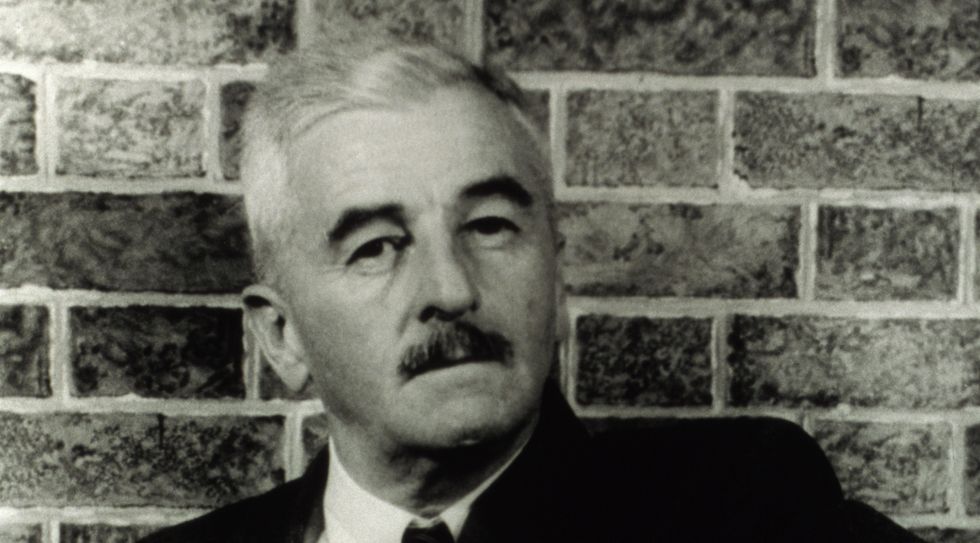On a cold morning in February 1957, a pipe-puffing figure in a neat tweed coat crossed the frozen grasses of UVA’s central lawn. A throng of officials, eager students, and camera-toting journalists swarmed forward to greet him. Smiling amiably, he passed through the flock of admirers, answering the perfunctory questions of the press conference and fading quickly out of sight. The day was February 15th, and the man was William Faulkner, Nobel Laureate, novelist of the south, and most recently UVA’s first Writer in Residence.
**
William Cuthbert Faulkner was born on September 25, 1897, in New Albany Mississippi.The son of a railroad treasurer, he was descended from a long line of wealthy southern aristocrats. Faulkner was born into a world that had even then almost passed away – the dying remnants of the old aristocracy, surrounded by the encroaching forces of modernity, progress, and time. Sensitive, withdrawn, and yet keenly intelligent, young Faulkner came of age imbibing the stories of his father and grandfather. From an early age, he possessed a more nuanced understanding of the South’s history than the majority of his contemporaries. Shunning the romanticized versions of southern history told by his elders, Faulkner took a tragic view of his native region – a time-bound land haunted by an ineradicable past.
By his teenage years, Faulkner had discovered the joy of poetry. But his hometown afforded few opportunities, and soon he ran off to enlist in the British military. Over the next several years Faulkner lived an itinerant lifestyle; attending and dropping out of the University of Mississippi, working for a time as a postmaster, and eventually doing odd jobs in New Orleans. Inspired by the melancholy mood and psychological complexity of Sherwood Anderson’s highly acclaimed novels, Faulkner produced his first work of fiction – Soldier’s Pay – in 1925. It was a failure.
Frustrated, Faulkner now began to conceive of a greater project – a fictional world for his novels, combining his themes of families, the past, and the fading Old South into a grand scheme of interconnected stories. This was the origin of Yoknapatawpha.
Sartoris – the first of Faulkner’s Byzantine chronicles of his fictional county and its people – was submitted to publishers in 1929. It was rejected. Depressed, disillusioned, and fighting a serious drinking problem, Faulkner readied himself for a last literary effort. And so The Sound and the Fury was born.
“A tale told by an idiot, full of sound and fury – signifying nothing?” The Sound and the Fury was a book like no other. Though the novel did not initially gain wide attention, it marked a key divergence within Faulkner’s career – the moment when he first became a world-class novelist, with works to be read alongside those of Tolstoy and Proust.
Faulkner had also married his longtime sweetheart Estelle Oldham, whom he had known since childhood. With Estelle and their two children, the writer moved back to Mississippi to work on the manuscript of his newest novel. The book, As I Lay Dying, continued Faulkner’s Yoknapatawpha cycle and was published in 1933. His next novel, the 1931 horror thriller, Sanctuary – earned him thousands of dollars. 1932’s Light in August marked the novelist’s return to Yoknapatawpha. By the late 1950’s, Faulkner’s growing notoriety forced him to adopt a more public presence. And one university was particularly interested in bringing the novelist on grounds to instruct future generations of writers
**
The idea of William Faulkner to UVA as a writer in residence was initially something of a novelty; no precedent existed for the position. Soon, a group of young scholars in the English department was able to convince the writer to take up his new position.
From the day of his arrival in February, Faulkner became an established figure on grounds. His most important accomplishment, however, was to finish his novel The Mansion – the concluding volume in his epic Snopes Trilogy. Faulkner chose to make himself readily available to the students, who frequently saw him taking walks on the Lawn, pipe perpetually in hand.By the time of his departure in 1959, Faulkner had left many memories among the University and the local population.
**
After leaving the University of Virginia, Faulkner’s life fell into a steep decline. A fall from a horse in 1959 seriously damaged the writer’s health, though he was able to continue work on his final novel, The Reivers, the racy tail of a country car thief and his growth to maturity in in Memphis. But a second horse fall in 1962 left Faulkner with thrombosis, soon leading to the writer’s death. At the University of Virginia, his legacy is still preserved.
In 2017 an exhibit devoted to Faulkner’s life and work was opened at UVA’s special collections library. Drafts of The Mansion and The Sound and the Fury andrecordings of Faulkner’s lectures and early editions of his novels and short stories went on display for the curiosity of incoming first years.
Today, Faulkner’s name at UVA lives on mostly through landmarks – apartments, a historic house, a name, and numbers on a map. The memory of the writer’s time at UVA is not common among the student body, and unlike Poe, he has no monument or plaque to record his residence. Yet a gaze across the Lawn on a cold February morning may bring to mind, for some, the remote but somehow present image of a pipe-smoking man in a tweed jacket, strolling by the Greek columns of the Rotunda, borne back ceaselessly into the past.



 women in street dancing
Photo by
women in street dancing
Photo by  man and woman standing in front of louver door
Photo by
man and woman standing in front of louver door
Photo by  man in black t-shirt holding coca cola bottle
Photo by
man in black t-shirt holding coca cola bottle
Photo by  red and white coca cola signage
Photo by
red and white coca cola signage
Photo by  man holding luggage photo
Photo by
man holding luggage photo
Photo by  topless boy in blue denim jeans riding red bicycle during daytime
Photo by
topless boy in blue denim jeans riding red bicycle during daytime
Photo by  trust spelled with wooden letter blocks on a table
Photo by
trust spelled with wooden letter blocks on a table
Photo by  Everyone is Welcome signage
Photo by
Everyone is Welcome signage
Photo by  man with cap and background with red and pink wall l
Photo by
man with cap and background with red and pink wall l
Photo by  difficult roads lead to beautiful destinations desk decor
Photo by
difficult roads lead to beautiful destinations desk decor
Photo by  photography of woman pointing her finger near an man
Photo by
photography of woman pointing her finger near an man
Photo by  closeup photography of woman smiling
Photo by
closeup photography of woman smiling
Photo by  a man doing a trick on a skateboard
Photo by
a man doing a trick on a skateboard
Photo by  two men
two men  running man on bridge
Photo by
running man on bridge
Photo by  orange white and black bag
Photo by
orange white and black bag
Photo by  girl sitting on gray rocks
Photo by
girl sitting on gray rocks
Photo by  assorted-color painted wall with painting materials
Photo by
assorted-color painted wall with painting materials
Photo by  three women sitting on brown wooden bench
Photo by
three women sitting on brown wooden bench
Photo by 
 Photo by
Photo by  Photo by
Photo by  Photo by
Photo by  Photo by
Photo by 


 people sitting on chair in front of computer
people sitting on chair in front of computer



 all stars lol GIF by Lifetime
all stars lol GIF by Lifetime two women talking while looking at laptop computerPhoto by
two women talking while looking at laptop computerPhoto by  shallow focus photography of two boys doing wacky facesPhoto by
shallow focus photography of two boys doing wacky facesPhoto by  happy birthday balloons with happy birthday textPhoto by
happy birthday balloons with happy birthday textPhoto by  itty-bitty living space." | The Genie shows Aladdin how… | Flickr
itty-bitty living space." | The Genie shows Aladdin how… | Flickr shallow focus photography of dog and catPhoto by
shallow focus photography of dog and catPhoto by  yellow Volkswagen van on roadPhoto by
yellow Volkswagen van on roadPhoto by  orange i have a crush on you neon light signagePhoto by
orange i have a crush on you neon light signagePhoto by  5 Tattoos Artist That Will Make You Want A Tattoo
5 Tattoos Artist That Will Make You Want A Tattoo woman biting pencil while sitting on chair in front of computer during daytimePhoto by
woman biting pencil while sitting on chair in front of computer during daytimePhoto by  a scrabbled wooden block spelling the word prizePhoto by
a scrabbled wooden block spelling the word prizePhoto by 
 StableDiffusion
StableDiffusion
 StableDiffusion
StableDiffusion
 StableDiffusion
StableDiffusion









